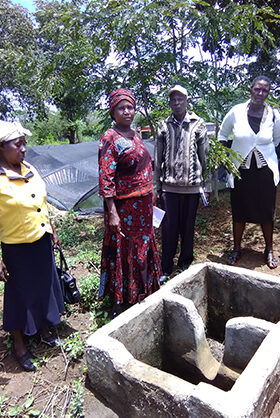ABM Archive Website
THIS WEBSITE CONTAINS ARCHIVE MATERIALS FOR HISTORICAL REFERENCE ONLY
For up-to-date information, including our latest appeals, news, and resources, please visit our current website.
Kenya: Sustainable Livelihoods Program Update
April 2018
Dr Terry Russell, ABM’s Effectiveness and Learning Coordinator, recently returned from a monitoring trip in Kenya and shares his story from the field about the positive impacts of the Sustainable Livelihoods Program:
 |
| Mary (in red) with leaders of Makakya Community Based Organisation. In front of them is the drainage tub which feeds water into the pond. Behind them, covered with a large plastic net, is the pond. |
What is a Kenyan farmer’s prized possession?
Mary Maundu is showing us her prized possession. It’s not a car or a refrigerator. Nobody in her village has those.
It’s a large pond. In Kyawango, an area in Kenya where there is no rain for 7-8 months every year, a large pond offers great security. She and her neighbours dug the pond and constructed drainage channels to bring rainwater to the pond.
Anglican Development Services Eastern (ADSE, ABM’s church partner organisation in Kenya) provided cement for the drainage tub, a plastic tarpaulin to line the pond, and irrigation equipment. ADSE also provided training on how to set up and use ‘drip irrigation’, so that farmers would not waste a drop of precious water. Now Mary and her neighbours are using the pond to grow vegetables all year round. That’s more security than a car or refrigerator could ever provide.
The farm pond and irrigation equipment has changed Mary’s life. Her husband had once been a hotel security guard but had lost his job after suffering an accident. Since then, he earned only an occasional trickle of income. Mary’s household – six children and four grandchildren – normally went hungry when food stocks ran low during the dry months. With the farm pond, she is now planting crops across much more of her land, safe in the knowledge that she has a 12-month water supply.
But the irrigation assistance is only one part of ADSE’s program, funded by ABM through ABM’s generous supporters and a grant from the Australian government Aid Program. Mary has also attended ADSE-run trainings in soil conservation, post-harvest food processing, grafting mango seedlings, making hay, making fuel efficient ovens, growing fast-growing vegetables like tomatoes and cabbages, and ‘potry’.
‘Pottery?’ I enquire, struggling to comprehend the unfamilar Kenyan accents around me. ‘So have you made some pots?’ Mary is bewildered, then one of her neighbours chimes in with a smile. ‘Not potry…potry!’ I’m still confused. Or maybe they are saying ‘poetry training’. ‘Yes, potry’, Mary explains, then she points to the side of the house. Scratching away in the bare earth are several chickens. ‘Ah, POULTRY training’, I declare triumphantly. ADSE had brought in a specialist to teach villagers about poultry diseases and how vaccines could greatly reduce the risk of chicken losses.
Mary and her neighbours learned well from the trainings. They used another component of ADSE’s program, savings and loans groups, to take out loans to buy more seeds to plant and more chickens and vaccines. Mary and her household are now busier but they have a secure food source and savings. Now one of Mary’s children has even started a second diploma course in one of the higher institutions of learning. ‘Before the ADSE program’, explains Mary, ‘we could never have even dreamed of that!’
< Back


